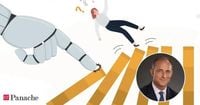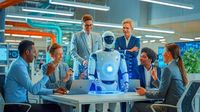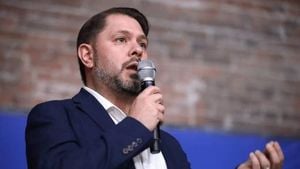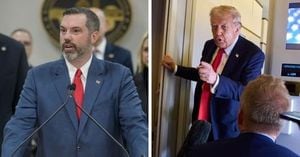On the cusp of a technological revolution, American workers and policymakers alike are grappling with the rapid rise of artificial intelligence (AI) and its sweeping effects on jobs, education, and the very structure of daily life. Recent developments—spanning bold legislative proposals, warnings from labor leaders, and predictions by tech visionaries—paint a complex picture of both promise and peril as AI weaves itself deeper into the nation’s economic fabric.
Arizona Senator Mark Kelly has emerged as a leading voice in this debate, unveiling his "AI for America" plan on September 20, 2025, in an effort to get ahead of the disruption AI is already causing. As reported by Axios and Punchbowl News, Kelly’s initiative marks a sharp shift from previous, more hands-off approaches. At its core, the plan would require major tech companies to contribute to a trust fund—dubbed the "AI Horizon Fund"—to help American workers whose jobs are threatened by automation and to address the environmental impact of ever-expanding AI infrastructure.
"I kind of felt like we were lacking a real plan," Kelly admitted in an interview with Punchbowl News, expressing regret that more proactive steps hadn’t been taken sooner. His proposal is not just about cushioning the blow for displaced workers; it also calls for a major investment in educating the next generation. According to Puck News, Kelly’s vision includes integrating AI literacy into K-12 curricula and developing workplace guidelines in partnership with labor unions—ensuring that workers, not just corporations, have a say in how AI is deployed.
The senator’s plan has found support in some influential quarters. Labor unions such as the Teamsters have backed the initiative, emphasizing the need for organized labor to help steer AI’s implementation. Even former President Barack Obama praised Kelly’s approach on social media, according to Kelly’s official Senate page. Meanwhile, MIT Professor Daron Acemoglu described the white paper as a "positive step" toward establishing more rigorous oversight of AI’s trajectory in the United States.
Financing the "AI Horizon Fund" is a central pillar of Kelly’s strategy. As outlined by The Arizona Republic, he proposes a new tax on AI companies’ revenues—an idea designed to ensure that the tech industry shares responsibility for the social and economic changes it is unleashing. The fund would operate independently of Congress’s usual appropriations cycle, a structural choice meant to guarantee steady support for affected workers and communities. "As a nation, we must seize this moment to build an AI boom for all, not another tech bubble for the few," Kelly asserted, underscoring the urgency of inclusive policy action.
Arizona Governor Katie Hobbs echoed these concerns, stressing the importance of preparing for the profound changes AI will bring. The growing political consensus among Democrats, as highlighted by Huffington Post, signals that the party is increasingly attuned to the challenges posed by AI—a shift that could reshape national tech policy in the coming years.
But the effects of AI are already being felt on the ground. On September 21, 2025, Steven Preston, CEO of Goodwill Industries, sounded the alarm about layoffs driven by automation. As The Economic Times reported, Preston warned that entry-level jobs—the traditional starting point for young adults without college degrees—are vanishing at an alarming rate, especially for Gen Z non-graduates. "For young people at that point in their life, to attach to something where they can see a future is so important," Preston said. The loss of these foundational roles threatens not only individual livelihoods but also the broader career pipelines that feed into mid-level and senior positions.
Preston’s advice to the next generation is blunt: adapt or risk being left behind. "Digital skills are really critical," he told Fortune, emphasizing that proficiency now means mastering workplace staples like Microsoft Excel and Google Docs, as well as AI platforms such as ChatGPT and Gemini. Those who move quickly to adopt these tools are already gaining a competitive edge, while older job seekers without digital fluency—some in their 30s and 40s—are increasingly "locked out of a massive percentage of the jobs that are available in the marketplace." For those uninterested in the corporate track, Preston suggests clean tech and other emerging fields as viable alternatives.
At the same time, tech industry leaders are predicting a seismic shift in how—and how much—we work. Eric Yuan, CEO of Zoom Technologies, Inc., recently told The New York Times that AI could soon make the five-day workweek obsolete. "Every company will support three days, four days a week. I think this ultimately frees up everyone's time," Yuan said. He believes that as AI agents take over more tasks, from writing code to managing routine operations, businesses will rapidly transition to shorter schedules.
Yuan is not alone in his outlook. Jamie Dimon, CEO of JPMorgan Chase, and Jensen Huang, CEO of Nvidia, have voiced similar views, with Huang’s company recently surpassing $3 trillion in value amid the AI boom. While Yuan acknowledges that "some jobs will disappear due to AI," he also sees a silver lining: more time for creativity, relaxation, and innovation. Still, he stresses, "Whenever there is a paradigm change in technology, some career prospects are lost, but new ones will also arise." The challenge, then, is to ensure that workers are prepared for these new opportunities.
Yet, not everyone is optimistic about the pace and direction of change. Federico Pascual, an engineer who forecasted AI’s impact a decade ago, was recently profiled for his prescient warnings. As reported on September 20, 2025, Pascual now predicts that by 2030, nearly 90% of news articles will be written by AI systems. He cautions that by 2029, computers could reach cognitive parity with humans, making it imperative for workers to "start looking at what we can do to avoid losing our jobs." While Pascual believes that "the basics are being automated," he maintains that "those with talent and who provide direction, judgment, or taste remain key."
Pascual’s concerns extend to the speed at which AI is being developed and deployed. He warns that companies often rush to release new systems before ensuring their safety, driven by fear of falling behind competitors. "At the end of the day, it all depends on us. We can stay behind or seize opportunities, but it's not technology that decides, it's how we deal with it," Pascual said, urging individuals to approach AI tools with curiosity and a willingness to learn.
Against this backdrop, the debate over AI’s future is heating up in boardrooms, classrooms, and kitchen tables across America. Policymakers like Senator Kelly are pushing for safeguards and new investments, labor leaders are calling for upskilling and adaptation, and technologists are both excited and anxious about what lies ahead. One thing is certain: as AI continues to transform the world of work, the choices made today will shape the opportunities—and risks—of tomorrow.





